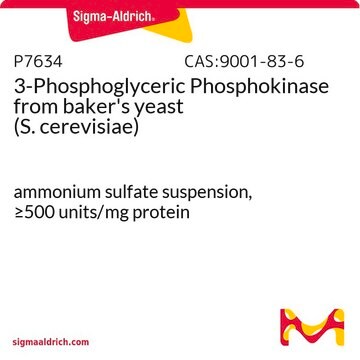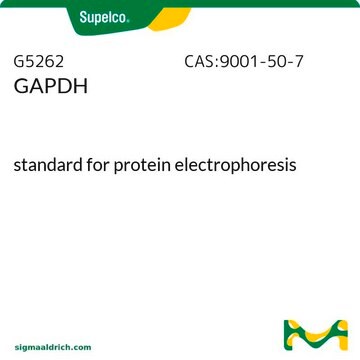G5537
Glyceraldehyde-3-phosphate Dehydrogenase from baker′s yeast (S. cerevisiae)
lyophilized powder, 70-140 units/mg protein
Synonyme(s) :
D-Glyceraldehyde 3-phosphate:NAD+ oxidoreductase (phosphorylating), GAPDH
Se connecterpour consulter vos tarifs contractuels et ceux de votre entreprise/organisme
About This Item
Produits recommandés
Forme
lyophilized powder
Niveau de qualité
Activité spécifique
70-140 units/mg protein
Composition
Protein, 30-70% biuret
Activité étrangère
3-Phosphoglyceric phosphokinase ≤0.05%
Température de stockage
−20°C
Actions biochimiques/physiologiques
Glyceraldehyde-3-phosphate dehydrogenase catalyzes the conversion of glyceraldehyde-3-phosphate to 1,3-bisphosphoglycerate as part of glycolysis. It has also been shown to have roles in initiation of apoptosis, transcription activation and the shuttling of ER to Golgi vesicles<<<,New>>>.
Définition de l'unité
One unit will reduce 1.0 μmole of 3-phosphoglycerate to D-glyceraldehyde 3-phosphate per min in a coupled system with 3-phosphoglyceric phosphokinase at pH 7.6 at 25 °C.
Forme physique
Lyophilized, sulfate-free powder stabilized with trehalose, citrate, and DTT. Useful for systems requiring low sulfate.
Inhibiteur
Réf. du produit
Description
Tarif
Code de la classe de stockage
13 - Non Combustible Solids
Classe de danger pour l'eau (WGK)
WGK 3
Point d'éclair (°F)
Not applicable
Point d'éclair (°C)
Not applicable
Équipement de protection individuelle
Eyeshields, Gloves, type N95 (US)
Faites votre choix parmi les versions les plus récentes :
Déjà en possession de ce produit ?
Retrouvez la documentation relative aux produits que vous avez récemment achetés dans la Bibliothèque de documents.
Les clients ont également consulté
A Tarze et al.
Oncogene, 26(18), 2606-2620 (2006-10-31)
Glyceraldehyde-3-phosphate dehydrogenase (GAPDH) is a pleiotropic enzyme that is overexpressed in apoptosis and in several human chronic pathologies. Here, we report that the protein accumulates in mitochondria during apoptosis, and induces the pro-apoptotic mitochondrial membrane permeabilization, a decisive event of
Lei Tong et al.
The Journal of biological chemistry, 284(17), 11256-11266 (2009-03-03)
Although the classical redox functions of co-enzyme NAD(+) are firmly established in metabolism, there are numerous enzymes that catalyze cleavage of NAD(+) to yield free ADP-ribose (ADPr) or related metabolites, whose functions remain largely unknown. Here we show that the
Michele Salemi et al.
Tumori, 98(3), 86e-88e (2012-07-25)
Head and neck squamous cell carcinoma (HNSCC) is one of the most common cancers in the world. Risk factors for this cancer include tobacco and alcohol use, ultraviolet light exposure, and viral infection. Parkinson's disease is one of the most
Qiao Liu et al.
Acta crystallographica. Section F, Structural biology and crystallization communications, 68(Pt 8), 978-980 (2012-08-08)
Glyceraldehyde-3-phosphate dehydrogenase (GAPDH) is an important enzyme in the glycolytic pathway. In addition to its conventional metabolic role, GAPDH has been identified to possess diverse cellular functions. In this study, glyceraldehyde-3-phosphate dehydrogenase 3, the third isoform of GAPDH from Saccharomyces
Shunqing Liang et al.
Veterinary immunology and immunopathology, 150(3-4), 198-205 (2012-10-23)
Edwardsiella tarda is a Gram-negative pathogen which causes systemic infection in turbot. The increasing frequency of edwardsiellosis in turbot farming has stressed the need to understand the immune responses of fish, for the further development of prevention and control strategies.
Notre équipe de scientifiques dispose d'une expérience dans tous les secteurs de la recherche, notamment en sciences de la vie, science des matériaux, synthèse chimique, chromatographie, analyse et dans de nombreux autres domaines..
Contacter notre Service technique











